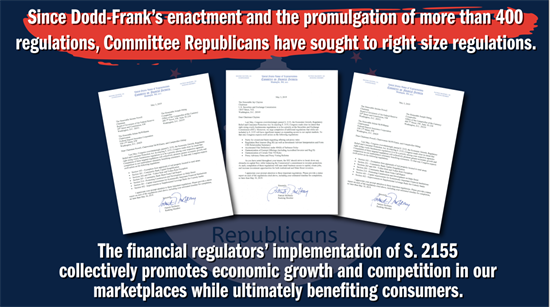WASHINGTON –Today, the House Financial Services Committee is holding a hearing with prudential regulators, including Vice Chair for Supervision of the Board of Governors of the Federal Reserve System, Randal Quarles; Chair of the Federal Deposit Insurance Corporation, Jelena McWilliams; and Chair of the National Credit Union Administration, Rodney Hood.
 |
Watch the Republican leader of the House Financial Services Committee, Patrick McHenry’s (NC-10), opening remarks here.
Ranking Member McHenry’s opening remarks as delivered:
“Thank you, Chairwoman, for holding this hearing today, it’s a very important and necessary hearing and good for our members to get this interaction with the regulators and I appreciate you all being here.
“And I want to thank Chairs Hood and McWilliams and Vice Chair Quarles for appearing before the committee today.
“I want to thank each of you not just for taking the time, but for prioritizing the commonsense reforms that are necessitated by the bipartisan law that we commonly refer to as S. 2155. The last time you testified before this hearing in May, we called on you all to take swift action on implementing this bill, and you’ve answered the call largely.
“Clarifying the Volcker Rule and tailoring requirements for foreign banks are just a few examples of regulatory rightsizing that you’ve implemented to ensure our economy, small businesses, and consumers remain vibrant and strong.
“However, there is more work to be done, there is certainly more work to be done. And what we’d like to see from you is the pace up and continue to up, so we are staying ahead of market conditions and economic conditions. We need to make sure that the tools are there to help serve consumers and communities.
“I also want to take this opportunity to raise a number of concerns that I continue to have.
“I’m concerned with the trend in the Federal Reserve’s open market operations and the wholesale funding markets.
“I appreciate Chairman Powell’s prompt response to my recent questions about the Federal Reserve’s repo market operations, and I understand there may be further interventions necessary at the end of the year. The Fed’s intervention in the repo market raises the important question of how regulatory changes to our financial system are impacting its structure and function and impacting monetary policy.
“I think it’s very important the Federal Reserve have its independent monetary policy standards, I think it’s very important for the global economy, the American economy, and the American consumers. But the regulatory changes it’s necessary for Congress to have oversight of those regulatory changes. And in this circumstance, if regulation is driving monetary policy—bad regulation is driving monetary policy—I think that raises greater concerns about financial stability in the market and also economic growth.
“In addition, the combined impact of proposed capital requirements, including Basel III revisions and the Stress Capital Buffer could have a significant impact on required capital if not thoughtfully implemented. This may further exacerbate the underlying issues that we’re seeing.
“So, it’s important to consider the system of capital requirements as a whole to ensure regulations are appropriately calibrated to allow institutions to continue to support economic growth.
“In addition, in May, I voiced my concerns with the transition from LIBOR to SOFR. Six months later I’m still concerned consumers will be impacted by this transition.
“Repo market intervention is just one example of why that is of concern and should be of concern to average, everyday investors.
“As you know, LIBOR’s the underlying bank reference rate for approximately $200 trillion in financial contracts worldwide and is set to be phased out as a bank reference rate by 2021 and replaced by SOFR.
“Given the volatility in the repo markets, I am concerned about the consequences that volatility will have on mortgages, auto loans, business loans, and other consumer loans as the new reference rate if that’s driving overnight financing.
“Transferring LIBOR-based legacy contracts to SOFR will also require financial institutions to renegotiate with consumers, customers, and expose banks to litigation risk. … And with that I will reserve the rest of my comments for my questions.
“Thank you for being here and I appreciate your attendance.”